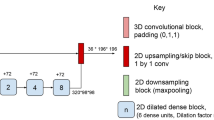Abstract
We propose a novel segmentation approach based on deep convolutional encoder networks and apply it to the segmentation of multiple sclerosis (MS) lesions in magnetic resonance images. Our model is a neural network that has both convolutional and deconvolutional layers, and combines feature extraction and segmentation prediction in a single model. The joint training of the feature extraction and prediction layers allows the model to automatically learn features that are optimized for accuracy for any given combination of image types. In contrast to existing automatic feature learning approaches, which are typically patch-based, our model learns features from entire images, which eliminates patch selection and redundant calculations at the overlap of neighboring patches and thereby speeds up the training. Our network also uses a novel objective function that works well for segmenting underrepresented classes, such as MS lesions. We have evaluated our method on the publicly available labeled cases from the MS lesion segmentation challenge 2008 data set, showing that our method performs comparably to the state-of-theart. In addition, we have evaluated our method on the images of 500 subjects from an MS clinical trial and varied the number of training samples from 5 to 250 to show that the segmentation performance can be greatly improved by having a representative data set.
Chapter PDF
Similar content being viewed by others
Keywords
References
Souplet, J.C., Lebrun, C., Ayache, N., Malandain, G.: An automatic segmentation of T2-FLAIR multiple sclerosis lesions. In: MIDAS Journal - MICCAI 2008 Workshop (2008)
Weiss, N., Rueckert, D., Rao, A.: Multiple sclerosis lesion segmentation using dictionary learning and sparse coding. In: Mori, K., Sakuma, I., Sato, Y., Barillot, C., Navab, N. (eds.) MICCAI 2013, Part I. LNCS, vol. 8149, pp. 735–742. Springer, Heidelberg (2013)
Geremia, E., Menze, B.H., Clatz, O., Konukoglu, E., Criminisi, A., Ayache, N.: Spatial decision forests for MS lesion segmentation in multi-channel MR images. In: Jiang, T., Navab, N., Pluim, J.P.W., Viergever, M.A. (eds.) MICCAI 2010, Part I. LNCS, vol. 6361, pp. 111–118. Springer, Heidelberg (2010)
Yoo, Y., Brosch, T., Traboulsee, A., Li, D.K.B., Tam, R.: Deep learning of image features from unlabeled data for multiple sclerosis lesion segmentation. In: Wu, G., Zhang, D., Zhou, L. (eds.) MLMI 2014. LNCS, vol. 8679, pp. 117–124. Springer, Heidelberg (2014)
Ciresan, D., Giusti, A., Schmidhuber, J.: Deep neural networks segment neuronal membranes in electron microscopy images. In: Advances in Neural Information Processing Systems, pp. 1–9 (2012)
LeCun, Y., Bottou, L., Bengio, Y., Haffner, P.: Gradient-based learning applied to document recognition. Proceedings of the IEEE 86(11), 2278–2324 (1998)
Kang, K., Wang, X.: Fully convolutional neural networks for crowd segmentation. arXiv preprint arXiv:1411.4464 (2014)
Zeiler, M.D., Taylor, G.W., Fergus, R.: Adaptive deconvolutional networks for mid and high level feature learning. In: 2011 IEEE International Conference on Computer Vision (ICCV), pp. 2018–2025. IEEE (2011)
Masci, J., Meier, U., Cireşan, D., Schmidhuber, J.: Stacked convolutional auto-encoders for hierarchical feature extraction. In: Honkela, T. (ed.) ICANN 2011, Part I. LNCS, vol. 6791, pp. 52–59. Springer, Heidelberg (2011)
Styner, M., Lee, J., Chin, B., Chin, M., Commowick, O., Tran, H., Markovic-Plese, S., Jewells, V., Warfield, S.: 3D segmentation in the clinic: A grand challenge II: MS lesion segmentation. In: MIDAS Journal - MICCAI 2008 Workshop, pp. 1–6 (2008)
Author information
Authors and Affiliations
Editor information
Editors and Affiliations
Rights and permissions
Copyright information
© 2015 Springer International Publishing Switzerland
About this paper
Cite this paper
Brosch, T., Yoo, Y., Tang, L.Y.W., Li, D.K.B., Traboulsee, A., Tam, R. (2015). Deep Convolutional Encoder Networks for Multiple Sclerosis Lesion Segmentation. In: Navab, N., Hornegger, J., Wells, W., Frangi, A. (eds) Medical Image Computing and Computer-Assisted Intervention – MICCAI 2015. MICCAI 2015. Lecture Notes in Computer Science(), vol 9351. Springer, Cham. https://doi.org/10.1007/978-3-319-24574-4_1
Download citation
DOI: https://doi.org/10.1007/978-3-319-24574-4_1
Published:
Publisher Name: Springer, Cham
Print ISBN: 978-3-319-24573-7
Online ISBN: 978-3-319-24574-4
eBook Packages: Computer ScienceComputer Science (R0)





